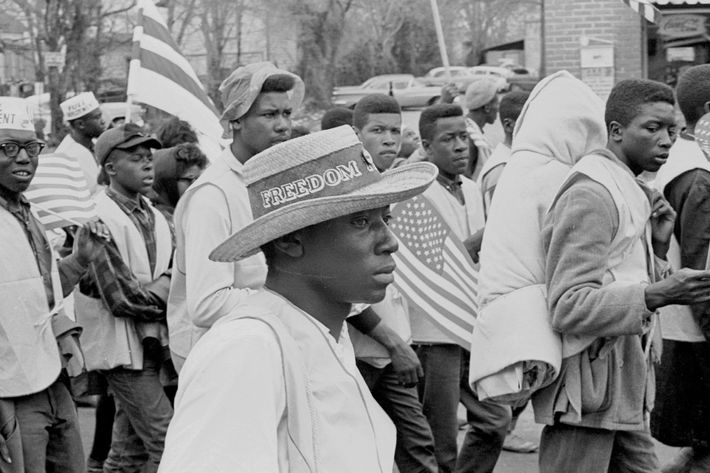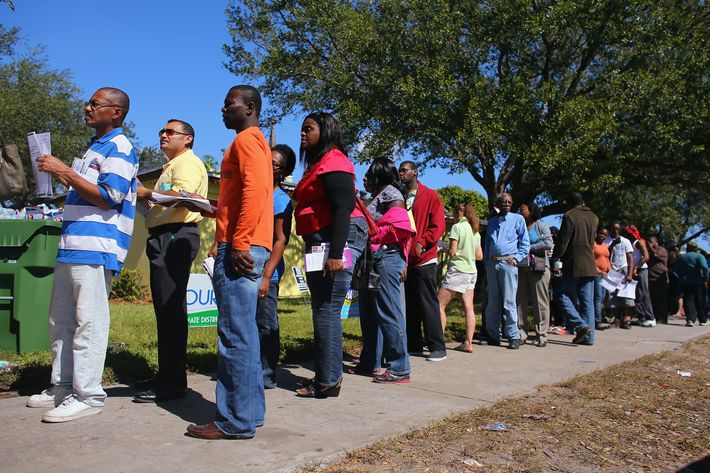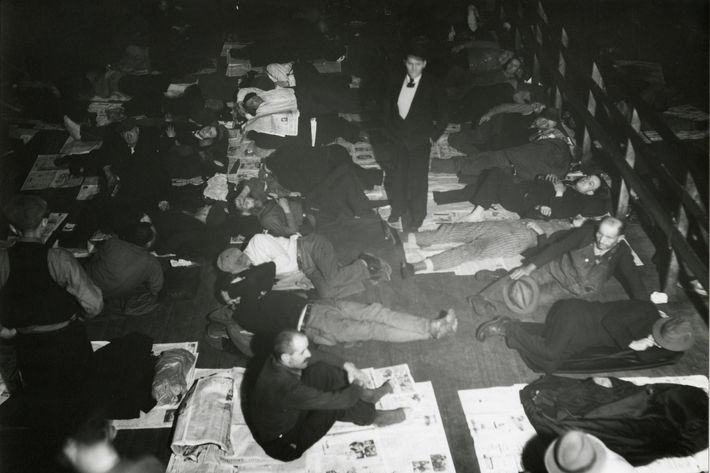
A pervasive sense of racial victimization has afflicted conservatives during the Obama years — the feeling that they are beset by a combination of false accusations of racism and actual anti-white racial animus that they dare not denounce lest they trigger still more false accusations of racism. That bundle of grievances resurfaced last week when North Carolina Republicans passed sweeping restrictions on voting rights, and Hillary Clinton declared in a speech, “Anyone who says that racial discrimination is no longer a problem in American elections must not be paying attention.”
Cast once again as the heirs to the political tradition of the segregated South, conservatives have lashed back. It is certainly true that modern Republican vote suppression pales in comparison with the pre-1965 version, in method and scale, to the point where equating the two is absurd. Segregated states used violence and “literacy tests” to disenfranchise the vast majority of the black population. The modern analogue instead works around the margins. Nobody is forcibly prohibited from voting. Instead, bureaucratic hurdles discourage some small share of disproportionately Democratic voters from voting.
Life can be hectic, time is short, there are kids and jobs, paperwork is a hassle — Republican election policy is to use these weapons to gain a few percentage points here and there. People with less money have less flexibility at work and less ability to navigate government paperwork requirements. It’s far, far less vicious than Jim Crow, and conservatives are justified in taking umbrage at the easy, frequent equations between the two that pervade liberal discourse.

But conservatives are not content to merely defend the party’s practices as “now 90 percent less evil!” They want to defend Republican vote suppression as a positive good, utterly untainted by racial or even partisan bias. Rich Lowry accuses Clinton of playing the race card; Jonathan Tobin denounces “fake outrage”; a bizarre, rambling National Review editorial calls objections to North Carolina’s laws “bunk.”
All three focus their defense on North Carolina’s requirement that voters have photographic identification, which they present as a rational response to voter fraud. This requirement places an additional burden on eligible voters who don’t have a driver’s license, who are disproportionately nonwhite. In order to vote, they have to go about finding alternate identification, adding another layer of hassle and potential confusion to the voting process. National Review sneers, “In general, Americans are very handy when it comes to acquiring free things issued by the government … oldsters manage to sign themselves up for Social Security and Medicare,” so we should assume they’ll jump through whatever administration hurdles are laid before them. But voting isn’t a “thing,” and, unlike social insurance, it has no financial value.
Republicans insist this disproportionate racial impact is merely incidental to the necessary task of preventing voter fraud. This explanation is hard to square with numerous facts: The kind of vote fraud I.D. requirements can prevent are vanishingly rare; vote fraud by mail, while still rare, is far more common, and also coincidentally used more heavily by Republicans; and North Carolina prohibits the use of college student identification as voter identification while also prohibiting college students from using out-of-state driver’s licenses for identification.
What’s more, every so often a Republican politician admits that the goal of vote-suppression laws is to reduce the minority vote. You don’t hear Republicans randomly confessing a racial animus lurks behind, say, their opposition to environmental legislation or their support for defense spending. It would be odd for these admissions to keep popping up completely at random for no reason.
And if voter-I.D. laws were solely designed to prevent fraudulent voting, rather than to winnow minorities and other Democratic-leaning constituencies from the electorate, why would they be paired with a host of other measures that do not prevent voter fraud but do winnow Democrats from the electorate? In addition to imposing a photo-I.D. requirement, North Carolina Republicans reduced early voting periods (which minorities disproportionately use), prohibited voting stations from extending voting hours when lines are too long, prevented voters who mistakenly go to the wrong precinct from casting a provisional ballot, and a host of other measures.

Surely all of these additional measures give the game away completely. The closest thing any of these columns mount to a defense of the GOP’s actual vote-suppression agenda (not just the one element on behalf of which they can mount a plausible-sounding justification) is this passage, from National Review. It does not mention the party’s broader restrictions on voting besides the I.D. requirement. However it expresses the idea — or, more accurately, the irritable mental gesture — that Democratic voting is inherently crooked:
Go down to the local homeless shelter, day-labor corner, or wino encampment, pull up with vans, and distribute such benefits as may be motivational in exchange for the effort of the denizens therein to cast their ballots.

Wino encampments? The point of this odd, paranoid digression seems to be that Democrats rely on the wrong kind of people and pay them something to vote, which is easier to do if it’s easier to vote. “Even the most able political machine can round up only so many people on Election Day,” argues the National Review editorial, “and those who are available for such rounding up often are not registered voters.” Note the assumption: They’re often not registered voters, made without any hard evidence. It’s just an inherent characteristic of a party reliant on winos, day laborers, the homeless, and the Wrong Sorts of People in general, which is why basically any restriction on the ability of Those People to vote is fine, because they shouldn’t be voting at all.
But don’t take this as an expression of racial animus. Lowry, who is also editor of National Review, complains in his Politico column that Democrats “are stuck in the 1950s and the 1960s, and in their demagoguery, disgrace the memory of genuine martyrs at a time when state and local officials in the South really did prevent blacks from voting through the most hideous means.” These days, the means are far less hideous, but the underlying sentiment is barely less so.






























